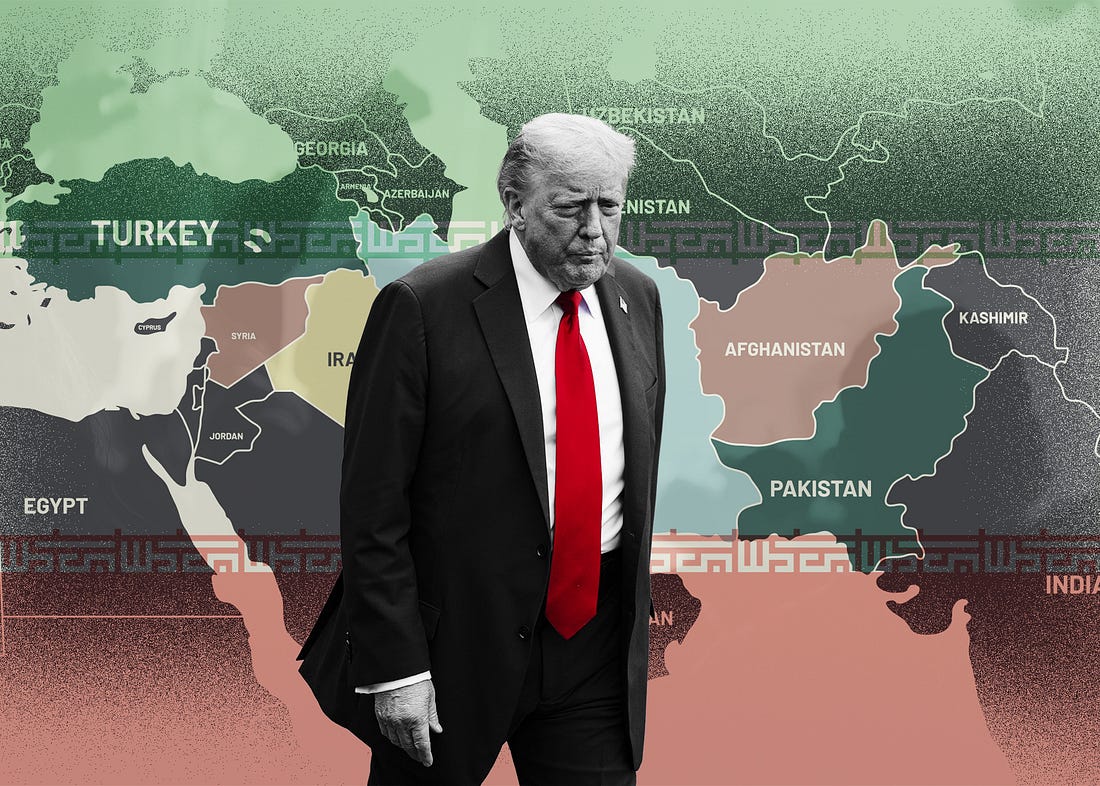|
 |
Donald Trump, Welcome To The League of Globalists
For Trump, America First isn’t an actual principle. It means whatever he says it means.
Minnesota is reeling from the shootings of several state lawmakers, but Donald Trump wants you to know he’s much too busy to call Gov. Tim Walz about the tragedy. After all, that’s time he could be using to slag on Tim Walz. “I think the governor of Minnesota is so whacked out,” Trump told reporters on Air Force One early this morning. “I’m not calling. Why would I call him? I could call and say, ‘Hi, how you doing?’ The guy doesn’t have a clue. He’s a mess. I could be nice and call, but why waste time?” Happy Tuesday.
Trump’s Iran End Game
by William Kristol
Donald Trump believes, as we all know, in an “America First” policy. At 7:24 p.m. yesterday evening, with war raging in the Middle East and debate erupting among the president’s supporters as to what he should or shouldn’t do about it, the president took to Truth Social to explain what “America First” means.
AMERICA FIRST means many GREAT things, including the fact that, IRAN CAN NOT HAVE A NUCLEAR WEAPON. MAKE AMERICA GREAT AGAIN!!!¹
Give credit where credit is due. “America First means many great things” is an elegant formulation for the fact that America First means whatever Donald Trump wants it to mean. And if you think—as I do—that a genuine America First policy would be today, as it was in 1940, foolish and dangerous, you’re pleased that Trump is basically throwing America First under the globalist bus.
In his post, Trump does tell us one thing unambiguously: Iran cannot have a nuclear weapon. This is the long-established position of the foreign policy establishment of both parties—the foreign policy establishment that so many of Trump’s followers hate.
The question then is, of course, the same one the foreign policy establishment has faced for years: How do you stop Iran from having a nuclear weapon? Can diplomacy do it? Or does one have to be willing to use, or to support the use of, military force? Will Donald Trump end up being a tough-talking version of Barack Obama? Or is he a secret convert to the views of John McCain?
Trump has been trying to have it both ways.
Earlier yesterday, Trump told reporters at the G7 in Canada that Iran would like to talk about a nuclear deal, and that Iran “should talk, and they should talk immediately, before it’s too late.”
As the day progressed, and as Iran’s apparent offer of some flexibility in talks seemed to fall far short of what Israel would even begin to consider, Trump’s hope for a deal seemed to fade. So at 6:30 p.m., Trump repeated his criticism of Iran for not signing a deal earlier. He once again said that “simply stated, IRAN CAN NOT HAVE A NUCLEAR WEAPON.” And he added, “Everyone should immediately evacuate Tehran!” That final sentence doesn’t sound as if its author expected a deal was imminent. On the way home from Canada, he told reporters that he’s not looking for a “ceasefire” but, rather, a “real end” to the standoff, which he defined as Iran “giving up entirely” on its nukes.
Soon after getting settled in at the White House, Trump had one last thought to share, this time at 1:15 in the morning:
Publicity seeking President Emmanuel Macron, of France, mistakenly said that I left the G7 Summit, in Canada, to go back to D.C. to work on a “cease fire” between Israel and Iran. Wrong! He has no idea why I am now on my way to Washington, but it certainly has nothing to do with a Cease Fire. Much bigger than that. Whether purposely or not, Emmanuel always gets it wrong. Stay Tuned!
Hmmm. Trump’s return “has nothing to do with a cease fire”?
Now it could be that Trump has something much bigger in mind than a cease fire: A grand bargain between Israel and Iran. But there’s not much indication such a deal is anywhere close to being in the cards.
So is Trump telling us that we might be getting ready to help Israel finish the job of denuclearization? Could he be getting ready to use U.S. assets to help ensure the complete denuclearization of Iran, and in the process possibly help the Iranian people to get rid of the terrible regime that afflicts them, that has killed many Americans, and that poses a constant threat to peace and stability in the region?
Who knows.
Last night, back in D.C., as rumors swirled that a U.S. action against Iran was underway, the Pentagon spokesman, Sean Parnell, posted this: “American Forces are maintaining their defensive posture and that has not changed. We will protect American troops & our interests.”
In saying that our defensive posture “has not changed,” Parnell implied it could change in the future—perhaps in the near future—if an offensive posture would help protect our interests.
Will War in Iran Help Russia?
by Cathy Young
The fight between Israel and Iran is unfolding some 2,000 miles away from the battlefields of Ukraine—but the two wars are interconnected in many ways, and whether the new conflagration in the Middle East will benefit Ukraine or Russia is a complicated but important question. If the ayatollahs’ regime in Tehran were to fall, this would be a massive political and geopolitical blow to Vladimir Putin (especially in the wake of losing a stronghold in Syria). But anything short of this scenario may benefit Russia in several ways.
Tehran is a key Kremlin ally, as well as an important source of imported weapons in Putin’s war: not only Shahed drones but aircraft and close-range ballistic missile
